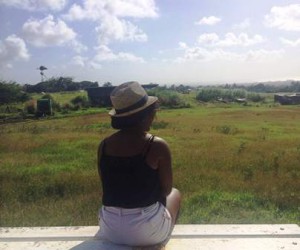
Submitted by Jasmine Anthony on the 2015 winter session program in Barbados sponsored by the Department of Human Development and Family Studies and the Department of Hotel, Restaurant, and Institutional Management…
When I meet a local, they always ask me how I like Barbados to which I reply, “I love it. I really do not want to leave.” I say this in hopes that they will offer to house me until I get established in Barbados! Thus, week three has been bitter sweet for I am truly having the time of my life, but my program is coming to an end. However, I made the most of my dwindling time on the island. One way I have been able to do so is by acquiring as much knowledge from the locals about the island as I possibly can.
Throughout my time on the island, I made an effort to really immerse myself in the culture and I have been successful in doing that. This is due to the gregarious nature of the locals. I usually can initiate conversations with most Bajans and they will entertain a whole conversation about any given topic. In talking to Bajans, I found that the island is not as problem free as it is advertised. Despite the fact that Barbados is one of the richest Caribbean islands, there are still several underlying issues.
Oddly enough, most of these issues are rooted in the island’s biggest industry, tourism. Because the government spends a good portion of their funds to provide hotels and other tourist attractions with the adequate amount of resources, the locals are left to fend for the scraps. For example, many locals experience water shortages because the majority of the island’s water goes to the hotels and resorts. Dr. Cristina Jönsson, a professor from the University of West Indies, attested to this fact for she once went two whole days without having access to running water inside her home. However, it is seldom that tourists experience such occurrences. Speaking as a tourist, I would have never thought this to be an issue for it seems as though there is an abundance of water, but I suppose that is precisely the problem. The needs of tourists appear to be more important than those of the citizens.
Another “little known fact” imparted on me by a Bajan is the flaws with the health care system. I am always so impressed when a country provides health care to its citizens. This is because until recently, health care was portrayed to be a luxury by the American government and not a necessity. However, Barbados patterns itself after England in terms of its government and social welfare policy. Thus, the Barbadians receive practically free health care. Upon asking Bajans about their health care system, they expressed their discontentment with the services provided to them. Many feel that the government provides subpar services to encourage citizens to utilize the private sector of health care. The private sector is growing in Barbados, despite the accessibility of free services.
In talking to the locals, I have learned a tremendous amount about Barbados. One commonality between all the people with whom I have spoken is that they have such pride in their country. I think that speaks volumes about the charm of this island. Regardless of its flaws, Barbadians proudly speak of their country’s accomplishments and heritage. They have a great deal to be proud of, most notably, the strength, kindness, and beauty of their people.



















